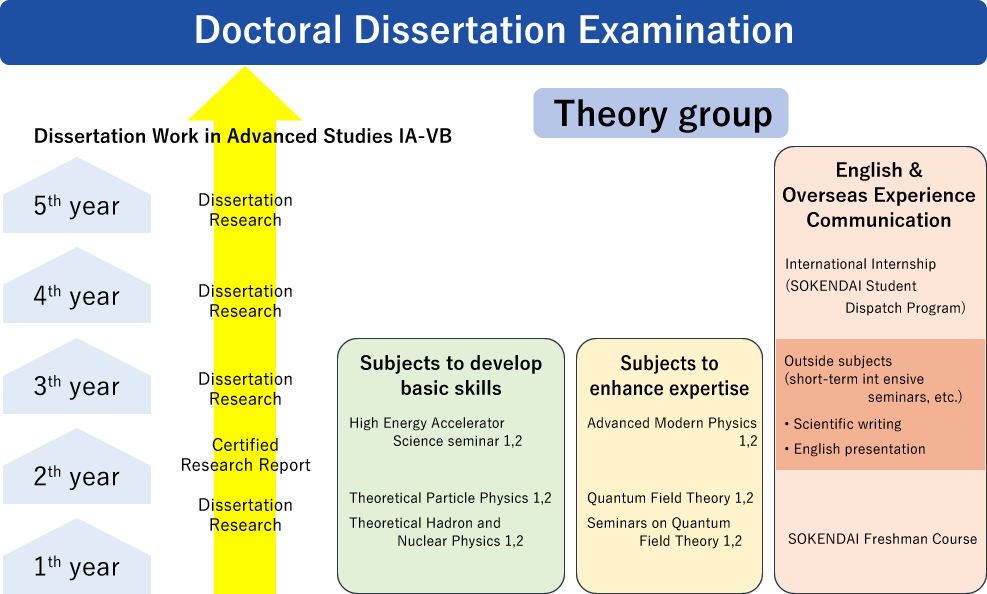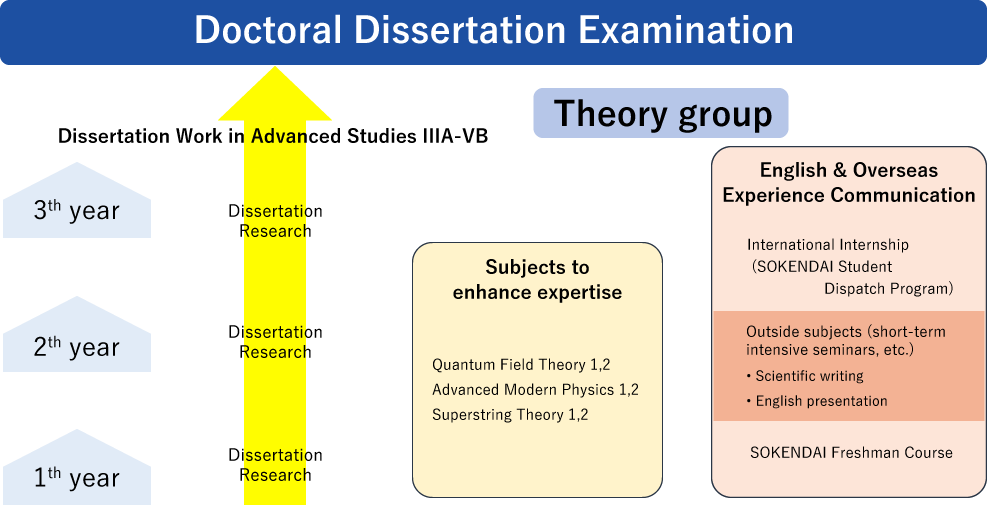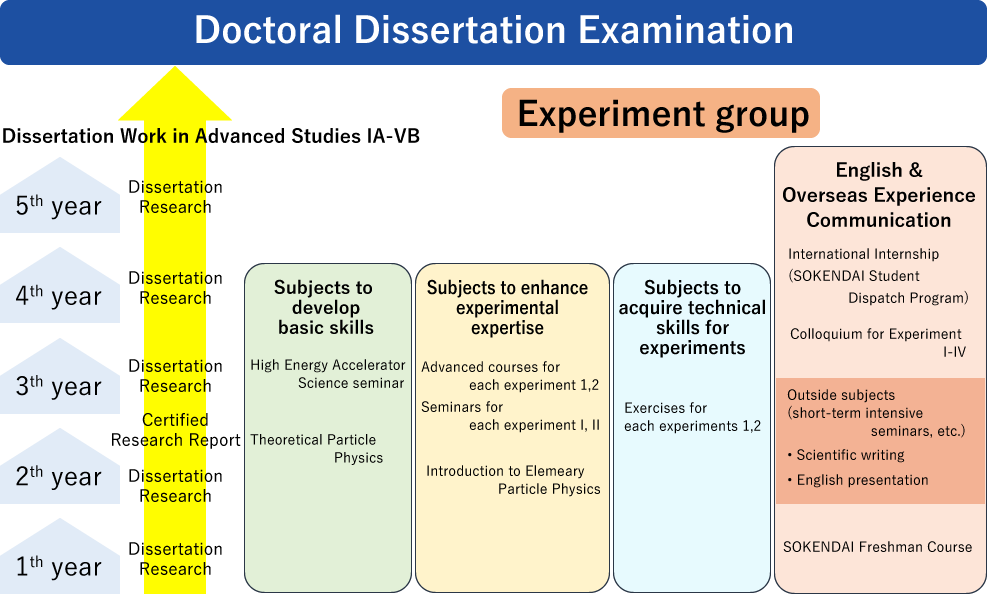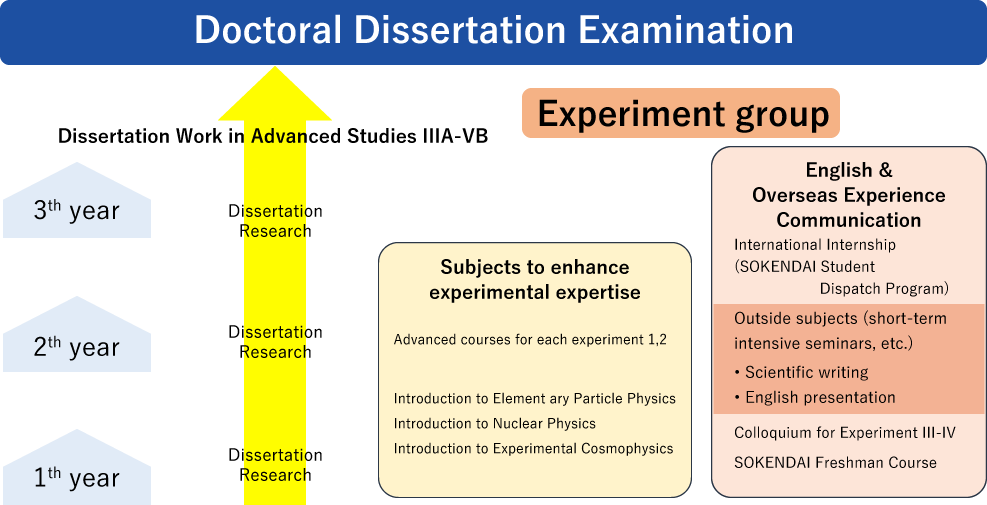COURSE
Program Outline
We aim to foster the next generation of researchers who will explore the origin andstructure of the universe. They will study how the universe works at the very smallest and largest levels-exploring elementary particles and atomic nuclei, alongside options to study cosmology and other related fields. We will give researchers a broad perspective, and high level of expertise, which will allow them to actively contribute to the future of research across many interrelated fields of science.
We offer two programs: a five-year doctoral program for students with a bachelor's degree and a three-year doctoral program for students with a master's degree. Students will belong to either the Theoretical Research Group or the Experimental Research Group of the Institute of Particle and Nuclear Studies (IPNS) at the High Energy Accelerator Research Organization (KEK). They will conduct their studies and research activities at KEK’s Tsukuba Campus, Tokai Campus, the Wako Nuclear Science Center, or at experimental facilities located worldwide.
Aims for Doctoral Candidates
This program aims to develop scientists who will play an active role in the next generation of society using their expertise in particle physics, nuclear physics, and cosmology. In particular, we will develop
- Researchers who have mastered the concepts and methods of physics, understands nature from a fundamental viewpoint, and promote advanced research on elementary particles, atomic nuclei, and the universe.
- Researchers who can independently identify issues that will lead to new academic developments and produce results without being constrained by conventional thinking or methods.
- Researchers who view their work from a broad perspective, and who can expand their research themes into related areas while maintaining their core specialization.
- Researchers who can actively interact with other researchers, both domestic and international, from closely related fields, and who can cooperate to develop new areas of investigation.
- Researchers who will always be conscious of searching for the truth as the goal of research, and who can play a social role by contributing to the expansion of humanity’s repository of knowledge.
Learning and Research Activities
Students in this program will undertake the following academic and research activities to acquire the skills needed for a doctoral degree.
- Through lectures and exercises, students will acquire specialized knowledge of particle physics, nuclear physics, and astrophysics, as well as the methodologies necessary for their research. Furthermore, using the specialized knowledge and methodologies acquired to tackle specific research problems, students will acquire the ability to undertake all stages of research, from defining an initial idea to writing a journal paper.
- Under the guidance of multiple faculty members, students will develop their ability to tackle academically important research problems using new ideas and methodologies and to link them to results. They will take advantage of the research environment at KEK, a facility hosting one of the world's state-of-the-art particle accelerators.
- KEK Students will acquire a broad perspective by participating in the interdisciplinary research activities conducted at KEK. They will have a flexible course structure, allowing them to study courses from across our curriculum, and they will receive personalized guidance for their research.
- KEK Students will acquire communication skills to build an international research network through daily interactions with top researchers visiting KEK from across Japan and overseas. They will also have the opportunity to engage in research activities abroad-these activities will be supported by the SOKENDAI Student Dispatch Program, the Joint Supervision Program, and the Exchange Program with Overseas Researchers, as well as other related programs.
- Through the opportunity to think about the social significance of academe and the role that researchers should play, students will gain a deep understanding of the significance of researchers' place in society.
A model diagram of a sample course of study is shown below. Students can choose a combination of various courses according to their interests and specialties while preparing their doctoral dissertation.
Curriculum Model of Particle and Nuclear Physics Program(Theory group) (Five-year doctoral program)

Curriculum Model of Particle and Nuclear Physics Program(Theory group) (Three-year doctoral program)

Curriculum Model of Particle and Nuclear Physics Program(Experiment group) (Five-year doctoral program)

Curriculum Model of Particle and Nuclear Physics Program(Experiment group) (Three-year doctoral program)
